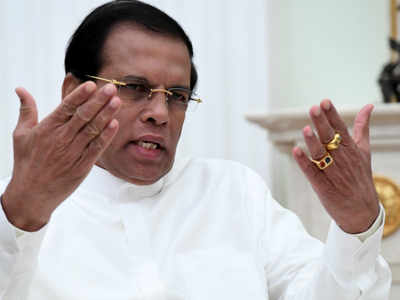COLOMBO, (Reuters) – A constitutional crisis in Sri Lanka deepened yesterday as President Maithripala Sirisena temporarily suspended parliament a day after sacking the prime minister and replacing him with a former leader seen as being close to China.
Sirisena fired Ranil Wickremesinghe and swore in former President Mahinda Rajapaksa as his replacement late on Friday in a move cheered by Rajapaksa supporters but described as a coup by opponents.
The president’s order to suspend parliament until Nov. 16 was widely seen as an attempt to stop Wickremesinghe from trying to prove he maintains a parliamentary majority even after Sirisena pulled his party out of the ruling coalition.
Wickremesinghe says he is still prime minister, and shortly before the suspension was announced he had urged the speaker to convene a session to show that he had a majority.
“I have the majority in the parliament, convene the parliament to resolve this,” Wickremesinghe told a news conference in Colombo on Saturday, flanked by all his coalition partners except Sirisena’s party.
Cheng Xueyuan, China’s envoy to Sri Lanka, sent Rajapaksa a customary congratulatory message but also paid a courtesy call on Wickremesinghe and said China would not interfere in the political crisis, sources close to the embassy told Reuters.
Sirisena ordered the police chief to withdraw the security detail provided to Wickremesinghe as prime minister.
The president also appointed an acting head for the government’s information department, which in a statement said that the cabinet had been dissolved with the appointment of a new prime minister.
An opposition legislator told local media that Sirisena will address the nation on Sunday and appoint a new cabinet on Monday.
At least one lawmaker from Wickremesinghe’s party said he would now back Rajapaksa and told reporters at least another 20 legislators also planned to change sides.
Under the constitution, the president can appoint a new prime minister if the current premier loses control of parliament.
An opposition leader and Rajapaksa ally G.L. Peiris said, however, that parliament’s suspension was aimed at facilitating the establishment of a new government.
“The parliament has to allocate new seats … we can’t arrange all these in one or two days. We need time,” he said.
An opposition legislator told local media that Sirisena would address the nation on Sunday and appoint a new cabinet on Monday.
The shutdown means the country’s national budget will not be released as scheduled on Nov. 5 and Peiris said the new administration would work with a temporary budget for now.
Firecrackers were set off in celebration in Colombo late on Friday as Sirisena administered the oath of office to Rajapaksa, while Wickremesinghe was off touring the country’s south.
Under Sri Lanka’s constitution, the president has executive powers while the prime minister heads parliament.
Hundreds of angry Wickremesinghe supporters turned to his official residence to express their solidarity to their leader, a four-time prime minister.
“Sirisena is a traitor. He let our leader down despite us bringing him to power,” one of the supporters told Reuters.
Media and Finance Minister Mangala Samaraweera called Wickremesinghe’s ouster “an anti-democratic coup”.
Wickremesinghe’s party has called on its supporters to hold a protest in the capital Colombo on Monday.
The crisis comes against a backdrop of weakening economic growth and follows months of infighting in the ruling coalition, and analysts say the heightened uncertainty could roil markets.
Relations between Wickremesinghe’s United National Party (UNP) and Sirisena’s United People’s Freedom Alliance (UPFA) became strained after Sirisena criticised Wickremesinghe for not adequately investigating an assassination plot targeting the president. The UPFA had threatened to quit the ruling coalition.
Sirisena accused Indian intelligence services of involvement in the plot, a claim denied by New Delhi and Colombo.
India, which has long seen Sri Lanka, located just off its southern tip, as part of its area of influence, has not yet commented about the crisis. The Foreign Ministry did not respond to a request seeking comment on Rajapaksa’s appointment.
India has been concerned about Rajapaksa’s ties to China. As president, he ushered in billions of dollars of investment from Beijing to help rebuild the country following the end of a 26-year-long civil war against Tamil separatists in 2009.
That investment has since put the island nation deep in debt and forced it to hand over control of a strategic southern port to China, drawing criticism from India and the United States.










